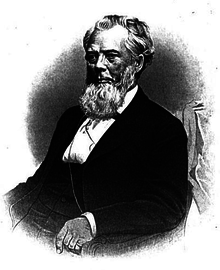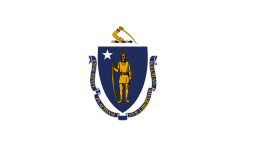Thomas D. Eliot
| Thomas Dawes Eliot | |
|---|---|
 | |
| Member of the U.S. House of Representatives from Massachusetts's 1st district | |
|
In office April 17, 1854 – March 3, 1855 | |
| Preceded by | Zeno Scudder |
| Succeeded by | Robert Bernard Hall |
|
In office March 4, 1859 – March 3, 1869 | |
| Preceded by | Robert Bernard Hall |
| Succeeded by | James Buffington |
| Member of the Massachusetts House of Representatives, and served in the Massachusetts State Senate | |
|
In office 1839 | |
| Member of the Massachusetts State Senate | |
|
In office 1846 | |
| Personal details | |
| Born |
March 20, 1808 Boston, Massachusetts |
| Died |
June 14, 1870 (aged 62) New Bedford, Massachusetts |
| Political party | Republican/Whig |
| Spouse(s) | Frances L. Brock[1] |
| Children | Caroline Dawes Eliot[1] |
| Signature |
|
Thomas Dawes Eliot (March 20, 1808 – June 14, 1870), was a member of the United States House of Representatives from Massachusetts. He was born in Boston on March 20, 1808. Eliot was named after his grandfather Justice Thomas Dawes of the Massachusetts Supreme Judicial Court.[1]
Eliot attended the public schools of Washington, D.C., and graduated from Columbian College in the District of Columbia, (now George Washington University in 1825. He was admitted to the bar and commenced practice in New Bedford, Massachusetts.
In 1834 Eliot married Frances L. Brock of Nantucket.[1]
Eliot served as a member of the Massachusetts House of Representatives, and served in the Massachusetts State Senate. He was elected as a Whig to the Thirty-third Congress to fill the vacancy caused by the resignation of Zeno Scudder and served from April 17, 1854, to March 3, 1855. He declined to be a candidate for renomination. Eliot was a delegate to the Free Soil Convention in Worcester in 1855.
He declined to be a candidate for nomination by the Republican for Attorney General of Massachusetts in 1857. He was elected as a Republican to the Thirty-sixth and to the four succeeding Congresses (March 4, 1859 – March 3, 1869). Eliot served as Chairman of the Committee Freedmen’s Affairs (Thirty-ninth and Fortieth Congresses), and the Committee on Commerce (Fortieth Congress). He declined to be a candidate for renomination in 1868. He resumed the practice of law and died on June 14, 1870. His interment was in Oak Grove Cemetery.[2]
Eliot's younger brother was William Greenleaf Eliot.
References
External links
- United States Congress. "Thomas D. Eliot (id: E000106)". Biographical Directory of the United States Congress.
| United States House of Representatives | ||
|---|---|---|
| Preceded by Zeno Scudder |
Member of the U.S. House of Representatives from Massachusetts's 1st congressional district April 17, 1854 – March 3, 1855 |
Succeeded by Robert B. Hall |
| Preceded by Robert B. Hall |
Member of the U.S. House of Representatives from Massachusetts's 1st congressional district March 4, 1859 – March 3, 1869 |
Succeeded by James Buffinton |

